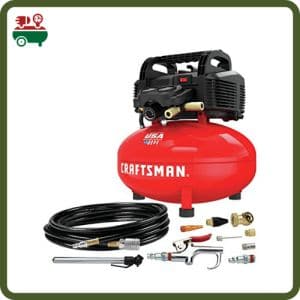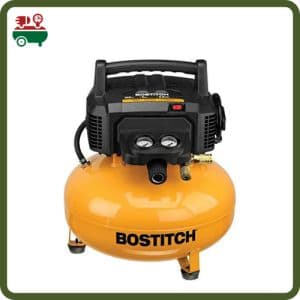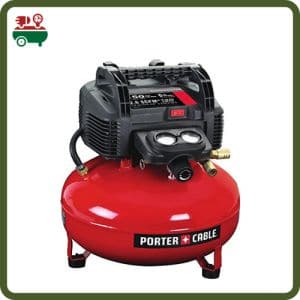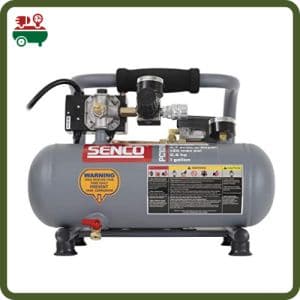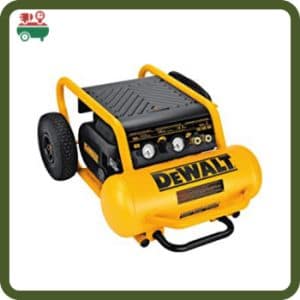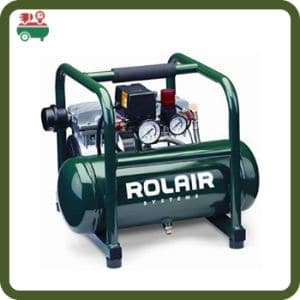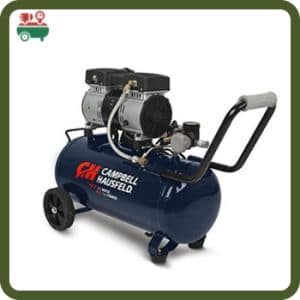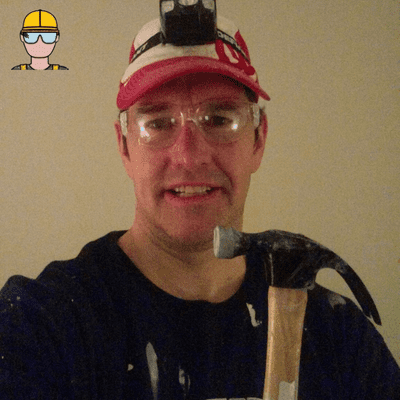Best Air Compressor for Roofing in 2023 (Top 8 Compressors Reviewed)
TheToolGeeks.com is a participant in the Amazon Services LLC Associates Program and other affiliate advertising programs. We may earn from qualifying purchases. (Learn More).
You’ve landed on this page, which means you’re looking for a helpful guide that will help you to choose the suitable air compressor for your roofing project, right? To help you out, we’ve enlisted some of the air compressors with detailed reviews for you to select the best air compressor for roofing.
While searching for the best air compressor for roofing, there are a lot of factors that you need to care about.
In this article, we will help you by giving some recommendations that are usually ideal for roofing.
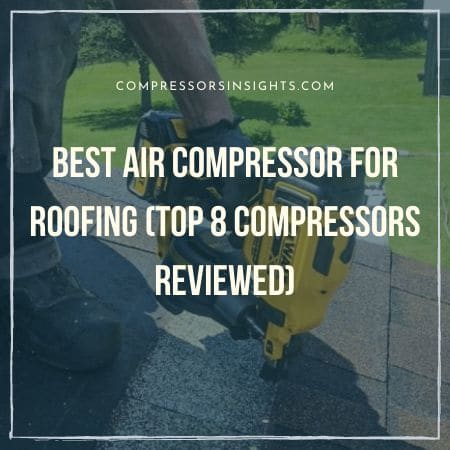
Best Air Compressor for Roofing (Top 8 Picks By Compressors Insights)
| IMAGE | PRODUCT | DETAILS | Â |
|---|---|---|---|
|
Â
Best Seller
 |
|
||
 |
|
||
|
Â
Top Recommendation
 |
|
||
 |
|
||
|
Â
Our recommendation
 |
|
||
 |
|
||
 |
|
||
 |
|
An air compressor is most important when you are doing roofing. Obviously, how will you survive the day if your compressor is not powerful enough for your project?
So, I gathered my team and tested some air compressors to see if they were fit for roofing. Also, we reached out to some construction technicians who use air compressors for roofing to see what they have to say about it.
1. CRAFTSMAN air compressor
Craftsman is one of the most popular air compressor companies that offer good capacity and capabilities. After conducting interviews with 3-5 customers, we got to know the abilities and performance of the compressor.
It is a 150 PSI compressor, which is quite good for roofing projects. The 2.5 SCFM of airflow at only 90 PSI makes it comfortable for roofing and inflating tires.
The users perform roof nailing, framing, bolting, finish nailing, and stapling.
As it is a portable compressor: you can take it with you anywhere and use it. One of the customers took the compressor with them on their trip, allowing them to avoid accidents and have an easy journey.
This powerful compressor not only has good capacity but is powerful with handles and feet (rubber), which helps avoid vibration, but customers reported it still creates noise. Its 0.8 HP motor is quite powerful and gives good smooth working.
As it is an oil-free and portable compressor, it does not require maintenance because it won’t run out of oil.
Portable and easy to carry
It has an easy drainage system
No maintenance required – Oil-free air compressorNoisy
2. BOSTITCH Pancake air compressor
This is another small but multipurpose air valuable compressor for daily usage and many more purposes. It’s our favorite, because we managed to use multiple tools with this air compressor.
With tool powering of 150 PSI max capacity, you can use this air compressor smoothly and efficiently. Although it is capable, do not expect it to be for professional purposes (too small for that).
This pancake compressor can pressure the nail driver, nailing, framing, and roofing because of the PSI level.
I personally liked that it comes with additional nozzles and supplies or accessories to avoid extra expenditures in the kit provided by the brand. Its kits include an air hose, nozzles, and a blow gun.
Its 2.6 SCFM at 90 PSI allows the daily working of house owners to go smoothly. (you can nail up to 7-8 nails at the same time). It takes up to 3-5 min to reach its maximum PSI level. And can provide stable air within 2-3 minutes.
The reading of the compressor is constructed on the top, which is easily visible to the viewer.
The compressor is only 29-30 lbs. weighted with a 6-Gallon tank capacity, and its handle construction is strong to make it easy to transfer or carry.
Conclusion: It can be considered a good compressor with its 150 PSI, but it’s 78.5 decibels sound emission makes it less loud or noisy. Its 8.8 HP motor is quite disappointing because it lowers the power and efficiency, but 1-year warranty provides a secure environment. However, it cannot be used for heavy-duty projects but is ideal for households or trips, picnics or other pneumatic tools powering purposes.
Portable and easy to carry
Easy-to-read pressure gauge
Maintenance-free & Oil-free
Not suitable for heavy-duty work – Needs breaks
Louder
The power cord is small, and you may need an extension cord
3. PORTER-CABLE air compressor
Porter cable also provides a compressor similar to the previous two in capability, performance, efficiency, and price. It is the same as the previous compressor but has a few differences, which we will discuss. So, you can choose it also according to your requirements.
This is also a 6-Gallon and 150 PSI compressor, which makes it great for roofing projects, households, workshops, or garage use. Other than roofing, you can do inflation, trimming, and nailing.
The compressor comes with two regulators and couplers for one or more people to use simultaneously. It has a shroud, handle and console cover protection, which makes it easy to carry.
This air compressor is good in many ways but not for library use or quiet locations because of its 84 dB noise level, while the ideal one is 60 decibels. It means it is noisy and can be a headache for the user and people around.
The compressor has 2.6 SCFM at 90 PSI and 3.7 SCFM at 40 PSI which also allows quick recovery of the compressor and saves time. It takes 3-4 minutes to refill it completely.
Additional features: It has rubber feet, and a water drain valve is oil-free, has low amps 120 (ideal for cold weather), is portable, and has less weight; the compressor allows easy transfer or carrying from one location to another. It can inflate RVs or campers.
It has a 1-year warranty and an accessory kit: 25-foot nylon hose, blow gun, quick coupler, plugs, tire gauge, and chuck with other attachments.
Lightweight and maintenance-free
It comes with an accessory kit
It is noisy
4. Senco PC1010
This small yet full-package compressor from Senco, which is relatively small in capacity but performs better than all previous compressors. Yes, we were also surprised when we put this air compressor to work.
This portable air compressor is easily carryable and transferable anytime on job sites or in homes. It is a powerful (because it has two different HP), durable, and portable compressors.
This one is also a multipurpose air compressor and could be used for renovation, crafts, roofing, and inflation of bikes and tires.
The best thing is that it can nail 20-44 nailers in a minute while making no noise because of low decibels. Also, it is pretty lightweight at only 20-pounds weight.
The motor and pump of this air compressor provide efficient working, and as the motor is oil-free, it becomes easier to use and maintain (it does not need maintenance). In addition, it has 1 and 0.5 HP capacity while running.
The tank has a 1-Gallon capacity which provides steady airflow, and tank gauges regulate the pressure. The best thing we like is its recovery time which is not even a minute.
You can literally use it anywhere, and nobody will be affected because of its 68 decibels noise level. It is lightweight and comes with a 1-year warranty.
Additional features are soft rubber feet: that make less vibration. Easy drainage valve at the bottom, the best dual pressure gauge feature through which you can monitor internal and external pressure.
Capable of performing heavy projects
Less noisy
Easy to carryRelatively expensive
5. Makita MAC2400 air compressor
Our team personally took this compressor test, and they were pretty satisfied with its performance. This big bore compressor is a high-performance compressor because its pump cylinder and piston provide pressure for two nailers smoothly.
According to our testing, the compressor has not been approved for quiet places because of its noise production of 79 dBA while running.
As it has a 2.5 HP motor: it becomes a durable and tough job-handling compressor.
Its recovery time is fast because of the bore and stroke, which increase compression. It is an oil-lubricated compressor which means it needs maintenance (to get the best out of your air compressor)
It has automatic style filters for increased air intake and remains cool while running.
As it is a 4.2 Gallon tank (but twin stacked tank), it sustains an operating pressure of 130 PSI max. It can deliver 40 PSI at 4.8 CFM and 90 PSI at 4.2 CFM (both are enough for two nailers).
This air compressor works on 120 Volts, and a low amp of 12.3, due to this the chances of tripping or motor failure gets eliminated. It can be used for roofing, nailing, stapling, construction purposes, tires, and remodelers. You can work on 3 confining nailers and 2 material- nailers.
Additional features: it has roll bar handles (provides protection), oil drainage and oil sighting glass, and a valve for tank drainage with a finned discharge tuber for heat. 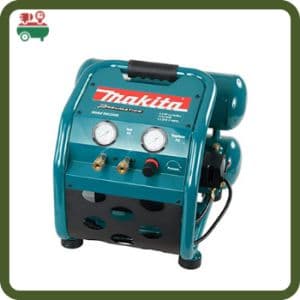
The compressor is lightweight
A compressor is a low-maintenance unit.
It has roll cage caters.
Although it is lightweight, it still is heavy relative to other compressors.
It is loud.
6. DEWALT Air Compressor
This one is also a part of our favorite air compressors list because of its high-pressure capabilities.
This air compressor is heavy-duty because of the 225 max PSI and 1.6 HP motor. It recovers quickly because of its 5 SCFM at 90 PSI.
Another thing we liked a lot was its non-flat foam tires which make transportation easier.
The one thing that didn’t impress us is that it’s noisy and cannot be used in quite an environment because of its 78 dBA noise emission.
The best thing is that it has a console panel that protects couplers, regulators, and gauges. Also, it’s a unit.
Checking the pressure reading was easy for us because of the 2-inch gauges. Also, the EHP technology increases the pump and motor lifespan.
Additional features: Roll-cage, vertical stand with foldable handles to carry it (saves space), it has 1 -a year warranty, and it comes with wheels (which makes it easier to carry it around).
The console panel and roll cage provides protection
Capable of performing heavy tasks
Not a quiet air compressor
7. Rolair JC10 Plus electric air compressor
This is another excellent compressor with good capacity from Rolair.
During our testing process, we went for customer reviews and experiences using this compressor, and everyone was happy with its less noisy nature.
Customers liked it the most because they could use it indoors as it does not make noise with its 60 dBA noise production.
With this compressor, you can efficiently perform trimming, roofing, nailing, and finishing-like tasks. Also, you can use this air compressor in freezing temperatures.
One of the best things we liked was the automatic switch off because it automatically switches off the compressor when it reaches the required pressure level. It is an oil-free compressor and needs no maintenance. (No need to check your air compressor oil level)
The compressor has a 2.5 Gallon tank capacity and is enclosed with a steel roll cage which provides protection not only to the motor (which has 1 HP running) of the compressor but also to the pump.
This compressor is not for heavy-duty projects but can perform small jobs at home, such as bike tire inflating, nailing, roofing, etc., efficiently because of its 2.4 CFM delivering capacity at 90 PSI.
Reliable and less noisy
Overload protection – Can save you from hazardsIt is heavy – Difficult transportation
8. Campbell Hausfeld air compressor
This good-capacity compressor allows easy and smooth working with efficient results. We recommend using it for medium heavy-duty projects and small jobs. As per roofing is concerned, it is much more capable of it. (So, yeah, it’s best for roofing)
This 8-Gallon tank storage air compressor has low noise decibels, which allows it to work indoors and in quiet places.
Other than roofing, you can also use this air compressor for inflating tires, trimming, crafting, art projects, airbrushing, decorating, and stapling.
The best thing is that heat or movement does not affect the compressor. Why? Because it has shroud protection. It works on 12 Volts, and a max PSI of 125 allows easy and quick working through 2.4 CFM at only 90 PSI.
Additional features: It comes with rubber handles (which makes the compressor portable and easy to carry), gauges and regulators (through which you can easily monitor the tank and pressure lines), and wheels that provide a more effortless movement.
You can use it in noise-sensitive areas
Ideal for heavy projects
It works 3 times more efficiently than a traditional compressorNot affordable
No accessory kit
CFM requirement for a roofing nailer
CFM requirements for roofing nailers depend upon the size of the work you will do. Mostly pneumatic tools work ideally with 5-6 CFM power. However, it is only on small-scale roofing nailers.
For example, a stapler and nailer need 0.3 and 2.2 CFM, which is different from other tools.
The roofing tool needs good power from the compressor, which enables the tool to work easily and smoothly. A good compressor with more than the required CFM will be helpful and efficient.
According to our experience after testing, we can say that if the requirement of your roofing tool is 3 CFM, then you need to have a compressor with more than 3 CFM which means at least 4-5 CFM compressors.
You would need CFM for your compressor to provide power to the attached tool for roofing, through which you will be able to do work smoothly and efficiently.
PSI requirement for a roofing nailer
The same goes for PSI requirements for roofing nailers as for CFM; you need good CFM and PSI to work together to provide smooth pressure to the tool through a compressor to have good results.
PSI is the force that the compressor will exert, which mostly does not matter because all 4-5 CFM compressors are most capable and have enough PSI.
Any tools will work on 90 PSI, a standard PSI, but to maintain the pressure, you need higher PSI pressure. For example, the roofing nailer can work with 70-9- PSI but to maintain and keep working; you need a maximum of more than 150 PSI.
Higher PSI will help you avoid wasting time waiting for recovery from the pressure, and you can do a job quickly. We’d recommend choosing a PSI above 120-130. If the PSI maximum is 130-150, that would be an ideal PSI.
Tank size and HP requirements
Tank capacity:
Tank size matters only when you need to store the air to help you avoid wasting refill time while roofing. It’s not like the tank is producing air. It is just storing the extra produced air.
We recommended using a small tank, as it’s easy to carry because of its medium weight.
If we talk about a roofing nailer, we recommend using at least 6 Gallon tank capacity compressor or a 2-6 Gallon compressor as it won’t be too small or large to carry around and will have enough space. ( depends on the working nature).
However, if you are a professional, we recommend using a large-capacity tank to avoid wasting time while it recovers.
HP requirements:
HP requirement for roofing nailers is a secondary factor besides CFM and PSI. You need a good motor to produce air constantly. The compressor’s horsepower should be enough to provide constant pressure to the tool.
We recommend using a 2-4 HP compressor but considering CFM and PSI as recommended because they are more important.
A 5 HP motor will use 24 amps at 220 V, while a 2 HP motor will take 15 amps at 110 V in electric motors. However, you will need up to 10 HP for a gas compressor.
Things to consider while getting the best air compressor for roofing
Weight
When selecting an air compressor for roofing, ensure that the compressor has less weight. The less the compressor’s mass, the easier it will be for you to carry and transfer it.
The heavy weight of the compressor makes it hard to carry the air compressor and complete your work. Make sure to consider the weight factor while deciding on the compressor for roofing.
Portability
You do not need a heavy-duty compressor for roofing, but a medium compressor with a good PSI and CFM will work. We recommended using a compressor that can handle the roofing tool and make work easier.
A portable compressor will be ideal because you can take them with you anywhere, and in the case of roofing, you can work with less storage compressor.
Capacity should be enough to make the work efficient. So, you can choose small tanks like 2-6, depending on the duration and frequency of your work.
Pressure
If you choose an air compressor for roofing, ensure it has a maximum pressure of 120-150 PSI. The higher maximum PSI makes the work smooth and efficient because it can complete multiple nails simultaneously.
Oil-free vs. oil-lubricated
Compared to oil-lubricated air compressors, oil-free air compressors do not require regular maintenance, cleaning, or oiling. They are oil-free, and you can work with them.
Oil-lubricated compressors, on the other hand, require regular maintenance. They need oil in their chambers which makes them cool and helps seal the air.
To be precise, for a roofing nailer, you need to have an easily maintainable compressor. So, we recommend using an oil-free one!!
Noise/vibration
Noisy air compressors can cause a great deal of trouble while working. So, choose according to your location. If a noisy compressor is your issue, always check the compressor’s decibels.
The best and average decibels are between 50-70 and above and are noisy compressors, so that you can avoid them!!
Durability
Generally, the air compressor is durable enough to last 10-15 years, but it is likely to differ with all compressors. Always check the warranty and customer reviews before making a decision.
Consider the life expectancy of the compressor while you are buying since this will impact your work and your wallet. Why would you buy an air compressor
Motor capacity & quality
A compressor can pump a certain amount of air according to its capacity. Capacity is cubic feet per minute CFM. A larger compressor has a better capacity for generating pressure.
The tools for roofing require a certain amount of air to work. CFM ratings for smaller compressors can be 90 PSI since this is the primary pressure needed to run the compressor. According to your needs, this will be a good PSI, but the maximum should be up to 130 PSI or more!!
Price
Different brands with similar features have different prices in the market. Make sure to do some research while selecting an air compressor and select one with a reasonable price.
Consider buying a long-lasting one to avoid wasting your time and money is the best choice; this is specifically important for professional users.
Amazon reviews & ratings
If you want to ensure that the compressor you buy is good, you can check from a reliable source: Amazon. Read reviews and specifications and talk to some users to know more.
Depending on your needs, it can help you select a compressor or guide you on “why you shouldn’t buy a particular compressor.”
Required maintenance
If you choose an oil-free compressor, there is no need for maintenance, but you have to keep an eye on the other parts of the compressor, such as valves and switch cables.
While an oil-lubricated compressor needs oiling, make sure to understand the maintenance procedure and requirements from its instructions.
What are the Benefits of Using an Air Compressor with a Roofing Nailer?
Some of the benefits of using an air compressor with a roofing nailer are the following:
- The air compressor can make the work easier.
- It helps the user to do tasks much quicker.
- It can store air.
- The compressor can run tools and equipment that need more than normal air.
Conclusion
While selecting the best air compressor for roofing, you need to first analyze your environment and your needs. You should know about air compressors if you want to get an air compressor for roofing. However, there are dozens of air compressors on the market.
In this article, we have listed eight of the brand’s air compressors which are compact, portable, durable, and powerful at the same time? They are less noisy and can handle heavy-duty tasks? You can check it out.
There are some factors to consider while choosing the ideal, best air compressor for a roofing nailer: weight, portability, durability, prices, Amazon reviews, air pressure requirement, and capacity. The compressor makes the task easier and helps you finish it faster.
CFM, PSI, and HP are crucial features of the compressor. The more the CFM is, the more fast and efficient work the compressor will perform. We hope this article will help you select the ideal compressor for yourself.
Amazon and the Amazon logo are trademarks of Amazon.com, Inc, or its affiliates.

